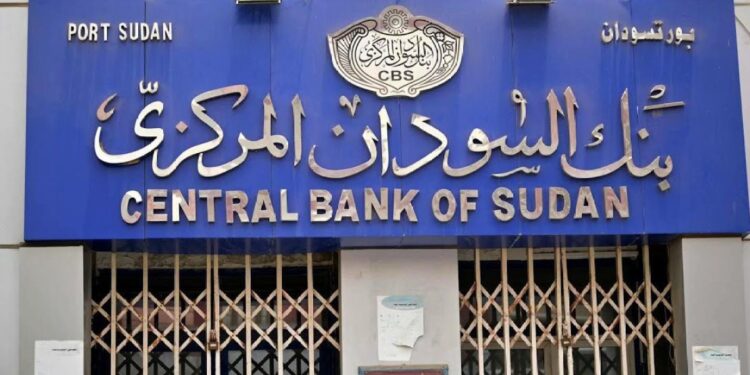Khartoum– After extending it for the second time, the process of replacing large denominations of the Sudanese pound will conclude next Monday, following citizen protests in the eastern states of the country, while the government revealed monitoring attempts by the Rapid Support Forces to destabilize the replacement of the new currency, which has banned its circulation in locations under its control.
On December 10, the exchange of banknotes in denominations of 500 pounds and 1,000 pounds began in the safe states, and the Central Bank of Sudan announced that the currencies in the hands of citizens in the states affected by the war would be cleared until they are replaced.
The process of replacing the currency is taking place in the states of the Red Sea, Kassala, Gedaref, River Nile, Northern, Sennar, White Nile, and the Blue Nile region, and will take place in Khartoum state within two weeks after the resumption of work of the Central Bank of Sudan branch in Omdurman.
The Supreme Committee for Currency Exchange announced the extension of the replacement period, starting from last Wednesday until next Monday, after protests took place in the cities of Port Sudan and Gedaref in the east of the country, due to the end of the currency replacement period without some citizens having the opportunity to exchange their savings.
Government warning
The Minister of Information and Sudanese government spokesman, Khaled Al-Aissar, said that the authorities had monitored attempts by parties affiliated with the rebellion – in reference to rapid support – to destabilize the currency replacement process.
He pointed out the presence of groups engaged in speculation in gold and crops, calling on citizens to be careful and careful not to deal with them.
Al-Aisar explained – in a press statement – that the Supreme Committee for Currency Exchange, headed by Sovereignty Council member Ibrahim Jaber, urged citizens to open bank accounts, and also discussed linking banking applications and directed to speed up the process of linking banks to facilitate the movement of money exchange.
Banks receive old currency from citizens and open bank accounts for them to deposit their money. The Bank of Sudan set a ceiling of 200,000 pounds (about 330 dollars) for daily withdrawals, which sparked a protest from businessmen and large farmers, considering that the specified amount for withdrawal does not allow them to meet their obligations towards daily workers who do not deal with them. With banking applications because they are in areas where there is no electricity or internet services.
Economic and security operation
Some Sudanese were active in purchasing cars, land, gold, and crops after the announcement of the currency change, while others resorted to handing over their banknotes to intermediaries in exchange for a bank transfer with a commission ranging between 10% and 20%, and banks also witnessed long queues.
Minister of Finance and National Economy, Jibril Ibrahim, believes that replacing the currency was an economic and security necessity due to the spread of counterfeit currencies looted from banks and citizens from the Rapid Support Forces, in addition to striving to achieve financial inclusion and link citizens to banks to transfer the cash mass to the banking system.
In an interview with Al Jazeera Net, the Minister of Finance explained that the process of replacing the currency was supposed to take place after the first months of the war, but the arrangements of the Bank of Sudan and financial conditions delayed the process and huge sums of money were deposited in banks in the states where the exchange was taking place.
Ibrahim downplays allegations about targeting citizens in rapid support sites and confirms that their savings and the money in their hands will be valid and cleared of liability and will be dealt with in buying and selling until they are replaced. Talk about targeting citizens in specific areas is considered a miserable attempt to politicize the process.
Ban the new currency
The Minister of Finance acknowledged the weakness of society’s relationship with the banking system, and spoke about the government’s efforts to attract citizens’ savings to banks, expand digital transactions, and pay all government fees with electronic payment, pointing to the efforts of the Ministry of Communications and Digital Transformation to facilitate the transfer of money via mobile phones without the Internet.
On the other hand, the civil administrations in areas controlled by the Rapid Support Forces issued a law banning the new currency, criminalizing dealing in it, and imposing penalties on violators.
The Legal Department of the Supreme Council for the Establishment of Civil Administrations for Rapid Support considered dealing in the new currency and its circulation a crime for which the law is accountable, and decided to ban it and not deal with it in areas controlled by the Rapid Support Forces.
For his part, banking expert Omar Ismail believes that conditions are not currently favorable for the process of replacing the currency, whether political, economic, security, or even the geographical unity of the country.
It is likely that the motives for replacing the currency currently are more political than economic, because the process of replacing it currently does not respond to the economic and financial conditions of the monetary reform processes within which the currency is replaced.
The banking expert explains to Al Jazeera Net that there are requirements that are supposed to be in place before starting to replace the currency, which are controlling excessive inflation rates, the continuous deterioration in the value of the currency, and the decline in purchasing power within the framework of comprehensive monetary reform so that the process of changing the currency achieves its economic and financial goals.



